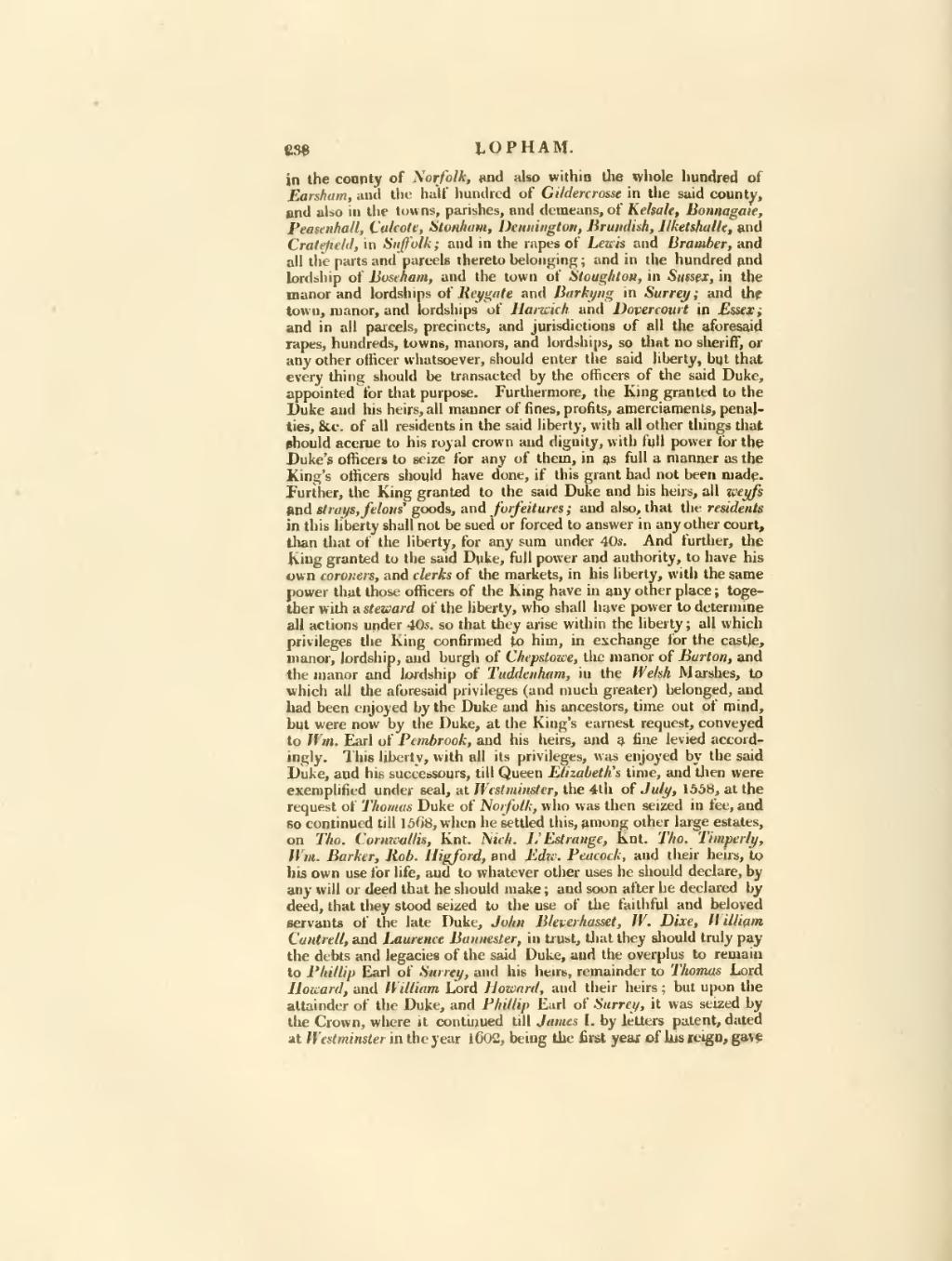of Norfolk, and also within the whole hundred of Earsham, and the half hundred of Gildercrosse in the said county, and also in the towns, parishes, and demeans, of Kelsale, Bonnagaie, Peasenhall, Calcote, Stonham, Dennington, Brundish, Ilketshalle, and Cratefield, in Suffolk; and in the rapes of Lewis and Bramber, and all the parts and parcels thereto belonging; and in the hundred and lordship of Boseham, and the town of Stoughton, in Sussex, in the manor and lordships of Reygate and Barkyng in Surrey; and the town, manor, and lordships of Harwich and Dovercourt in Essex; and in all parcels, precincts, and jurisdictions of all the aforesaid rapes, hundreds, towns, manors, and lordships, so that no sheriff, or any other officer whatsoever, should enter the said liberty, but that every thing should be transacted by the officers of the said Duke, appointed for that purpose. Furthermore, the King granted to the Duke and his heirs, all manner of fines, profits, amerciaments, penalties, &c. of all residents in the said liberty, with all other things that should accrue to his royal crown and dignity, with full power for the Duke's officers to seize for any of them, in as full a manner as the King's officers should have done, if this grant had not been made. Further, the King granted to the said Duke and his heirs, all weyfs and strays, felons' goods, and forfeitures; and also, that the residents in this liberty shall not be sued or forced to answer in any other court, than that of the liberty, for any sum under 40s. And further, the King granted to the said Duke, full power and authority, to have his own coroners, and clerks of the markets, in his liberty, with the same power that those officers of the King have in any other place; together with a steward of the liberty, who shall have power to determine all actions under 40s. so that they arise within the liberty; all which privileges the King confirmed to him, in exchange for the castle, manor, lordship, and burgh of Chepstowe, the manor of Barton, and the manor and lordship of Tuddenham, in the Welsh Marshes, to which all the aforesaid privileges (and much greater) belonged, and had been enjoyed by the Duke and his ancestors, time out of mind, but were now by the Duke, at the King's earnest request, conveyed to Wm. Earl of Pembrook, and his heirs, and a fine levied accordingly. This liberty, with all its privileges, was enjoyed by the said Duke, and his successours, till Queen Elizabeth's time, and then were exemplified under seal, at Westminster, the 4th of July, 1558, at the request of Thomas Duke of Norfolk, who was then seized in fee, and so continued till 1568, when he settled this, among other large estates, on Tho. Cornwallis, Knt. Nich. L'Estrange, Knt. Tho. Timperly, Wm. Barker, Rob. Higford, and Edw. Peacock, and their heirs, to his own use for life, and to whatever other uses he should declare, by any will or deed that he should make; and soon after he declared by deed, that they stood seized to the use of the faithful and beloved servants of the late Duke, John Bleverhasset, W. Dixe, William Cantrell, and Laurence Bannester, in trust, that they should truly pay the debts and legacies of the said Duke, and the overplus to remain to Phillip Earl of Surrey, and his heirs, remainder to Thomas Lord Howard, and William Lord Howard, and their heirs; but upon the attainder of the Duke, and Phillip Earl of Surrey, it was seized by the Crown, where it continued till James I. by letters patent, dated at Westminster in the year 1602, being the first year of his reign, gave
